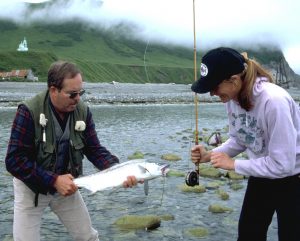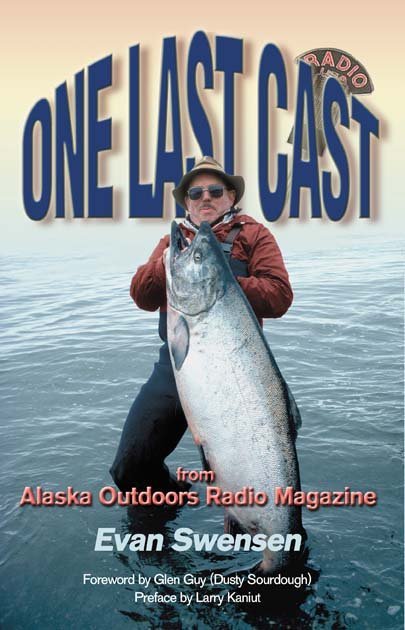One Last Cast
From Alaska Outdoors Radio Magazine
By Evan Swensen
Chapter Seventy-seven
Listen To The Guide

One Kodiak river I never tire of fishing is the Karluk. On my first trip to Karluk, during the short boat ride from the airport to the lodge, I began receiving my Karluk River education. The guide explained that the fish come in on the tide. It is best to start fishing at the mouth as the tide starts moving. Follow the fish as they move upriver into the lagoon. Once high water is reached, the fishing will stop. There will be no more fish at the mouth until the next tide. The fish will move upriver into the holes, and it will be hot up there when it’s not any good down at the mouth. When the fish move through the upper holes and upriver, it’s time to go back and try the mouth again. Somewhere in between, there’ll be time for three meals and sleep.
My excitement about fishing the Karluk was short-lived when I met Paul, one of the lodge’s guests. “How’s the fishing?” I asked.
“Not too good. It’s the same here as at the lodge where I was last year. I had a good time, but the fishing was not what it was cracked up to be. I don’t think Alaska fishing is all that great. My guide thinks I’ll do better at the mouth. He says the kings will be coming in on the tide. I hope it’s not just another guide story.”
The guide shouted, “Fish on!” as Paul hooked up on his first cast. The fish started upriver, then turned downriver, and headed for the open sea. The guide assumed his role and began to counsel Paul. “Keep the tip up; let the rod do the work.”
The fish took line out at about 10 yards a second. Paul turned his drag tighter, and the guide told him to leave it alone. “It’s set right. Don’t tighten the drag; move along the beach with the fish.”
Paul planted his feet firmly on shore and tightened the drag as if he didn’t hear. The rod tip dropped until it was pointed directly at the running fish. The line continued to play off the reel as Paul leaned back and held on. The telltale rifle-shot-like sound of breaking line signaled the end of the fight as Paul almost fell backward when the forward pull quit abruptly.
The guide discovered that Paul’s reel was utterly worn out. All the gears were gone. “It’s a new reel,” Paul exclaimed, “It can’t be broken already.”
The guide tried to explain. “Paul, you’re using a very heavy line. The drag is set way too tight. These are big strong fish from the ocean, and you need to follow them downriver and out of swift water.” The guide loaned Paul another outfit brought along for just such an emergency.
As much as Paul had hooked up on his first cast, he was now the expert and would not listen to the guide. He was wearing chest waders and insisted on standing in water over his waist, even if it meant wading into the hole and casting beyond the fish. As the tide advanced, the guide moved two other guests and me up the lagoon to the rock pile. Paul insisted on fishing where he had earlier hooked the fish. We soon limited out and began fishing for sport. Paul continued to ignore the guide and came up empty.
When the tide peaked, the fishing quit. The fish moved on up the lagoon out of reach. We headed for the lodge and dinner. Paul remained to fish the outgoing tide, where he stayed until dark. He reported that he didn’t even get a bite. He had tenacity but didn’t have enough sense to listen to the guide.
The following two days were repeats of the first afternoon. Up river and down, everyone caught fish. Sockeyes, kings, Dollies, and rainbows. Everyone except Paul. Finally, in frustration, the guide waded out to where Paul was standing.
“Paul, you’ve got to listen to me. You’re standing right where the fish are moving through. You fish at the wrong time, in the wrong place, use the wrong lure, and the wrong approach. You’ve got to listen to me if you want to catch fish.”
Paul responded, “I’ll try a few more casts here and then move on up.” With that, the guide gave up on Paul.
Guides tell me there are guys like Paul on almost every trip. They think they know more than the guide and keep fishing “a better way.” Guides take personal pride in seeing their clients catch fish. When they don’t, it’s almost a personal affront. There is competition among guides at every fishing lodge. They add up the score of the day’s catch with each other. They don’t like it if someone doesn’t catch fish. They’ll break their backs to ensure their client has the best chance to land what he paid for.
Alaska is a fish-rich state. No one need ever come up empty fishing its waters. Most anglers have enough brains to look around and follow other successful fishermen when they themselves are not doing well. Almost everyone will share bait ideas or techniques with others willing to listen.
I hope anyone Paul tells, “the fishing in Alaska is not what it’s cracked up to be,” knows better. I wish Paul would return to the Karluk. Next time, Paul, listen to your guide, and you’ll catch fish until you wish you hadn’t listened.


